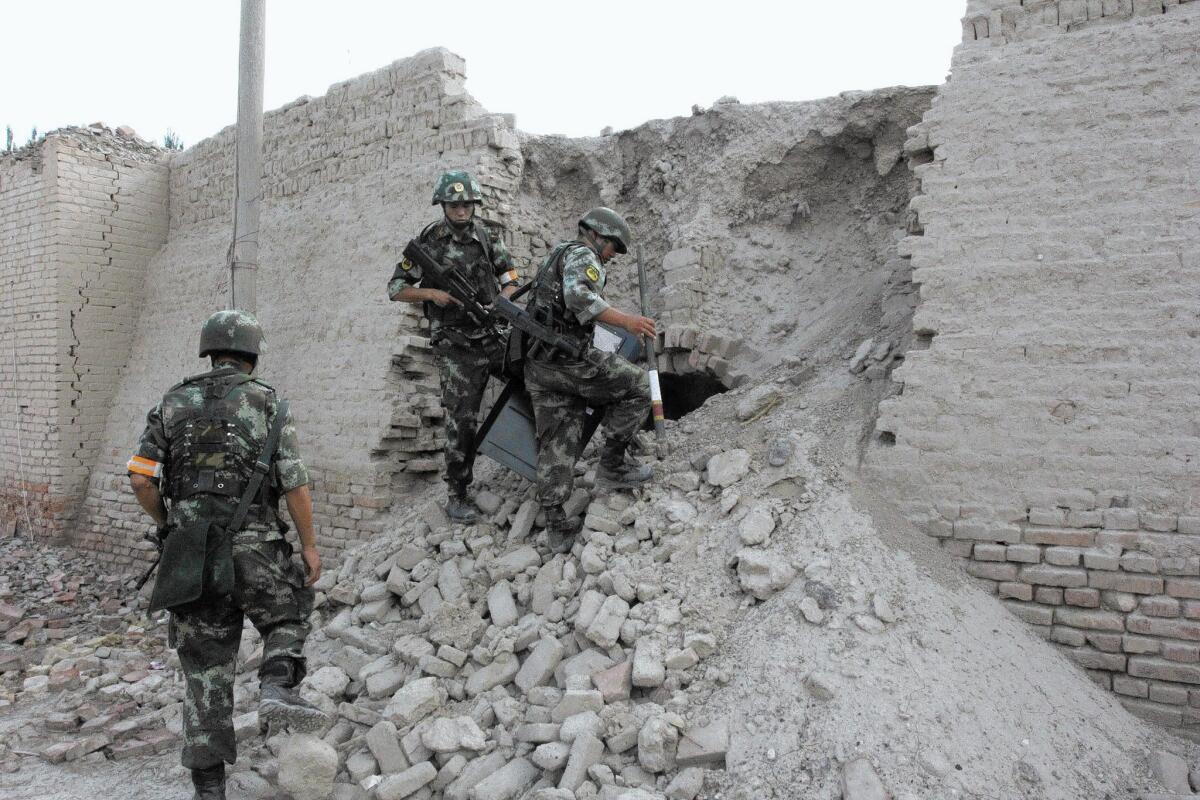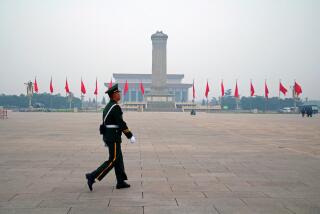China airing details about suspects in terrorist attacks

Just who are the alleged extremists responsible for the wave of terrorist attacks across China in the last year?
A bearded man who recorded himself burning the flags of China, the U.S., Pakistan and Egypt. But also his elderly mother, wrinkled and missing many teeth. A couple with two children, ages 6 and 2. An 18-year-old with a pregnant wife. And a 19-year-old construction worker from a poor family with a junior high school education.
These are among the details provided in recent weeks by state-run media amid an intense crackdown by Chinese authorities aimed at halting the knifings, bombings and other acts of violence that have claimed hundreds of lives.
China has blamed separatists and Islamic militants, including those affiliated with a group it identifies as the East Turkestan Islamic Movement. East Turkestan is another name for China’s far western province of Xinjiang, home to a Muslim, Turkic-speaking ethnic minority known as Uighurs.
For months, the perpetrators had largely remained ciphers, with the government maintaining a tight grip on information, sometimes not even releasing arrestees’ names, ages or hometowns, let alone specifics on their personal backgrounds or possible motivations.
Now, officials have begun doling out select bits of information. State-run news outlets have aired security-camera footage of some attacks and home videos made by accused assailants. They’ve also released what are described as prison confessionals. Reporters for state-run media have been provided access to at least half a dozen suspects and convicts for jailhouse exclusives, allowing the public its first — tightly controlled — opportunity to see and hear from the men and women accused of the attacks.
“I learned the word jihad for the first time after I watched some videos” in the spring in the southern Xinjiang city of Hotan, suspect Nurmemet Abidili, 19, told an interviewer in a program that aired in August on China Central Television. “Before that, I didn’t have any idea about this in my brain; I had never heard of it.”
Abidili, a construction worker, has been accused of taking part in July’s slaying of the prominent 74-year-old imam of a state-sanctioned mosque in Kashgar.
“I saw a DVD in May or June in 2012, and I had thought of doing jihad after watching,” Husanjan Wuxur said in the same broadcast — two days after his execution was announced by the government.
Wuxur was convicted of helping carry out a fiery jeep crash in Beijing’s Tiananmen Square last year that left five people dead and 39 injured. He left behind his wife, Gulnar Tuhtiniyaz (who received a life sentence for participating in the planning) and their two children, 6 and 2.
The state-run accounts cannot be verified independently — no foreign journalists or rights groups have had access to the detainees, and if any had lawyers, no attorneys have come forth to speak on behalf of their clients.
“In China’s criminal justice system, there are problems of torture, coerced confessions and lack of access to legal counsel,” said Maya Wang, a Hong Kong-based researcher for Human Rights Watch. “In these cases, there is so little independent information about them, it makes it difficult to evaluate the Chinese government’s claims.”
The publicity campaign may be an effort by authorities to publicly demonstrate that their “strike hard” campaign is on the right track. But it may also be aimed at helping convince Western governments and analysts that the violence is tied to global militant campaigns rather than Chinese repression. Many foreign observers have generally regarded Uighur unrest as resistance to policies limiting Uighur language, culture and religious practices, or as a home-grown independence movement.
The release of videos and other materials “will help China establish that there are terrorist attacks inspired by jihadism in the country and dispel doubts in the West that China is fabricating such incidents,” said Jacob Zenn, an analyst at the Washington-based Jamestown Foundation who has studied Uighur militants.
“The homemade and unsophisticated nature of the videos and lack of reference to foreign jihadist groups and themes, however, suggests that the militants are likely locally rooted,” Zenn said.
Although state-run media reports have given the public an inkling of who may be behind the violence, they have touched only obliquely on possible motives.
In the interview snippets, none of the suspects and convicts called themselves a member of the East Turkestan Islamic Movement or any other separatist group, none said they received training abroad, none voiced support for an independent Xinjiang, and none criticized the Chinese government or discussed politics.
Abidili, accused in the imam’s slaying, said robotically: “ We never wanted to just beat him or curse at [the imam], we just wanted to kill him.”
Likewise, suspect Nurmemet Muerzhati, gave an apolitical explanation for why he participated in a deadly knife attack on a Hotan mahjongg parlor.
“He just told me about jihad and said if I carry out jihad, I won’t be put on trial after I die,” Muerzhati said, referring to an unnamed religious mentor. “I just listened to [my partners] and did this kind of thing, slashed people.”
“The three assailants got brainwashed by extreme religious thoughts in only one month,” remarked TV host Bai Yansong, referring to Muerzhati and his two accomplices.
Rohan Gunaratna, a terrorism expert at Nanyang Technological University in Singapore, said that although such TV broadcasts do not mention it, “there is resentment, frustration and anger on the part of Uighurs against Beijing and the local administration. That is why the [extremist] ideology is finding such resonance.”
Gunaratna said Chinese authorities ought to work hand in hand with local Islamic religious leaders to “preserve the traditional moderate character of Xinjiang Muslims.”
But the recent slaying of the imam at the state-sanctioned mosque in Kashgar, Gunaratna said, is an ominous sign. The imam, Jume Tahir, had been a strong supporter of government policies and had denounced separatists; some Uighurs regarded him as a sellout. The fatal stabbing came almost a year after another cleric, Abdurehim Damaolla, was killed near his home in Turpan; Damaolla had been deputy chairman of that city’s government-affiliated Islamic Assn.
“This is very symbolic — it is not just an attack on a police station or something like that; I think the killing of the imam [Tahir] is a turning point,” Gunaratna said. “It shows the extremist ideology is spreading, and other imams may become more cautious. This is an attempt to silence moderates.”
Tommy Yang and Nicole Liu of The Times’ Beijing bureau contributed to this report.
More to Read
Start your day right
Sign up for Essential California for news, features and recommendations from the L.A. Times and beyond in your inbox six days a week.
You may occasionally receive promotional content from the Los Angeles Times.







